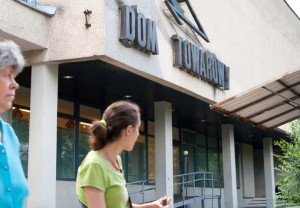- June 5, 2012
- 525
Will the new Language Law allow the use of Polish?

It is possible that very soon Poles in Lithuania will be at least partially able to use their mother tongue in public space and topographical naming. For this to occur however, at least two conditions have to be fulfilled.
Firstly, the Parliament has to approve amendments to the State Language Law, which currently allows a limited use of minority languages in names and public space. Secondly, these suggestions have to be upheld during the debate over the amendments. While the first condition can be fulfilled since nothing prevents the Parliament from amending an outdated law, fulfilling the second one would be near-miraculous since the current Parliament more than once has shown its anti -Polish attitude, once by rejecting the law on writing Polish names the day before the late President Lech Kaczyński visited Lithuania, and the second time when, in retaliation for the so called Polish ultimatum to Lithuania from 1938 and against the opposition from Lithuanian Poles, it passed a new Education Law on March 17th, according to the Polish minority greatly worsening the situation of minority education in Lithuania.
‘It is also worth pointing out that the governmental project of the Education Law, which is currently under debate in Parliament, suggested preserving the system of teaching in minority schools existing so far, which has been accepted by Polish community. During the debate, however, the character of the law was changed from at worst neutral to one restricting teaching in the native language,’ thinks Jarosław Narkiewicz, a Member of Parliament from Electoral Action of Poles in Lithuania. And, he adds, similar scenario can be expected from the debate over amendments to the State Language Law.
‘Already during the first reading in Parliament there has been a discussion on the subject,’ says Narkiewicz. ‘Just yesterday a debate has started in the Parliament concerning the State Language Law and the package of laws associated with it.’
‘I think that amending the State Language Commission Law is the most important aspect of this package since the other amendments broaden the powers of the Commission at the cost of, among others, the self-governing bodies,’ explains Narkiewicz and adds that this is the reason why AWPL opposes passing the amendments to language laws, since it thinks that they ought to be reviewed concurrently with the Bill of Ethnic and National Minorities, prepared for years by a special committee.
‘Otherwise the current amendments to the Language Law will yet again restrict the use of minority languages in public life and no other bill will regulate their use,’ stresses Narkiewicz.
While the bill does not regulate the use of minority languages – which is noted in the preamble – the project does allow the possibility of using the minority languages in a public space and topographical naming; mostly, however, for tourism purposes. Such purposes are determined by the local governments but then they will have to be approved by a “higher instance,” which is to say an appropriate government agency. Despite that Lithuanian media are already in an uproar about how the “tourism purposes” may be a loophole for the Lithuanian Poles to use their language in public which so far they have been persecuted and heavily fined for.
The authors of amendments to the Language Law, among them a conservative MP Valentinas Stundys who authored amendments to the Education Law unfavorable towards Poles, admit in an interview with delfi.lt that the amendments to the Language Law really allow for the use of minority languages for tourism purposes but at the same time they justify themselves saying that the regulation was never intended in the first place.
‘We can thus expect that this loophole will be closed in the near future,’ retorts Jarosław Narkiewicz.
In his opinion, a far greater threat is the passage which requires the organizers of public events, cultural events included, to organize them in Lithuanian and provide a translator when not doing so.
‘This means that Polish events such as “Kwiaty Polskie” or “Dziewczyna Kuriera” will have to be either organized in Lithuanian or translated,’ notes Narkiewicz.
Source: http://kurierwilenski.lt/2012/06/05/czyzby-ustawa-jezykowa-pozwoli-na-uzywanie-polskiego/
Tłumaczenie Andrzej Rola w ramach praktyk w Europejskiej Fundacji Praw Człowieka, www.efhr.eu. Translated by Andrzej Rola within the framework of a traineeship programme of the European Foundation of Human Rights, www.efhr.eu.
![]()

